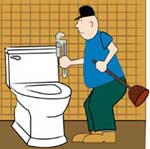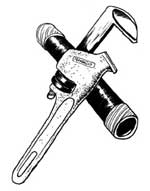Plumbing Repairs as the Family Handyman
This page delivers tips on completing plumbing repairs for the family handyman in order to maintain proper water supply and drainage in your home.
Water supply and drainage are the most important factors in today's world of germ-fighting, scent-reduction, and healthy-living. Subsequently, plumbing problems in the home create the highest level of anxiety.
However, for the family handyman, completing plumbing repairs can be a snap with a little bit of patience, planning, and helpful plumbing tips like the ones below:
Tips for the family handyman plumber:
- Successful plumbing repairs depend heavily on selecting the right materials for the job.
- When laying out new piping in your home, plan for beams, joists, studs, and rafters along the path
- Always have two tanks of soldering propane on hand. You always run out of propane in the middle of a job.
- Before soldering to repair in-service piping, turn on as many taps as you can to relieve pressure in the system and allow any steam to escape (after shutting off the main supply, of course).
- Make sure the pipe is clear of water before soldering. Water in the pipe will absorb the heat and keep the pipe to cool to melt solder. Steam can also create holes in solder melted around a joint.
- If water continues to flow into the area you are trying to solder, shove a piece of plain white bread into the pipe to soak up the water. Once the job is complete and the water is turned on, the bread will dissolve and come out naturally in through a faucet. Never use bread with seeds in it!
- Always heat the pipe to melt the solder. Keep the flame an inch or two away from the place where you are joining fittings to a piece of pipe. Placing the solder in the flame to melt it will not form a good seal.
- Always clean the outside of the copper pipe with sandpaper or steel wool, and the inside of the copper fitting with a steel bristled pipe brush, and apply a layer of soldering flux to each before connecting the two and soldering together. This ensures a clean surface and proper seal.
- Always wear old clothing when plumbing. You WILL get dirty, and plumbing dirt does not come off easily - no matter what the advertisements tell you.
- Working with ABS drain pipes? Make sure to measure, then re-measure, and measure again. Cut the pipe, fit it together, assess correctness, adjust, fit together, and glue only after you're completely satisfied. If your gut tells you there's something off, listen to your gut. Double check your work from start to finish before gluing!
- Household drain pipes are generally 1 1/2" from fixtures, running into 4" piping that drain into 6" piping to your city sewage connection or sewage tank (if you live outside city limits).
Tools the family handyman can't do without:
- Two adjustable wrenches. Adjustable wrenches will get you out of a lot of trouble.
- Two pair of vice-grips. These are handy clamping devices for holding pipes in place.
- Monkey wrench, and other assorted wrenches
- Lighter or matches (to light the soldering torch)
- Soldering torch
- Utility knife
- Hack saw and file
- Pipe wire brush
- Pipe cutter (there are a couple of types, depending on the type of pipe you choose to use)
Materials the family handyman can't do without for ad hoc plumbing repairs:
- Pipe and fittings (there are a number varieties)
- Soldering flux
- Steel wool or sandpaper (medium grit)
- Plumbing tape (Teflon tape)
- Propane tanks
- Pipe clamps and hangers
- Band-aids
- Swear jar
Okay, you might not need the last two, but you might as well know plumbing repairs are frustrating. Allow yourself time. It's best to tackle plumbing repairs when you're alone. Kids and other distractions can lead to mistakes - which can turn costly in a number of ways if you aren't careful.
Thanks for the tips on plumbing repairs. Take me home.
|


